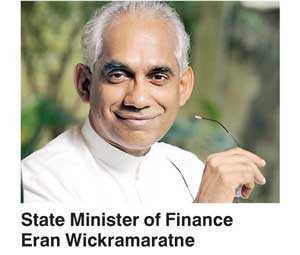Sunday Feb 22, 2026
Sunday Feb 22, 2026
Thursday, 19 July 2018 00:21 - - {{hitsCtrl.values.hits}}
By Ashwin Hemmathagama
Parliament yesterday approved the Nation Building Tax (NBT) (Amendment) Bill with changes allowing several sectors to be exempted from NBT to increase entrepreneurship opportunities and foster economic growth.
Moving the Nation Building Tax (Amendment) Bill second reading debate at Parliament, State Minister of Finance Eran Wickramaratne said that NBT exemptions were one of the proposals of the Budget, and the Government was moving the amendment to allow its implementation. Under the new regulations certain aspects under tourism, imported gems for value addition, equipment for advanced agriculture and machinery for coconut oil production and related items are exempted from NBT. 
The Nation Building Tax (NBT) was introduced in 2009 by the Rajapaksa administration on importers, manufacturers, retail and wholesale operators of goods and services. “Initially NBT of 2% was levied based on the turnover. Based on the 2018 Budget, this was amended to include one particular item and to release the remainder from NBT. We levied NBT on liquor. Some matters related to tourism, importing of gem stones for value addition and re-export, equipment used for advanced agricultural technology, equipment necessary for coconut oil and related industry are exempted from NBT. With effect from 1 August 2017, contacted agreements on construction were also exempted from NBT,” the State Minister said.
Exemptions on NBT is targeted at expanding and incubating entrepreneurship in Sri Lanka, according to Wickramaratne. The Minister pointed out that, compared to other countries, Sri Lanka had a smaller percentage of entrepreneurs and it was essential to expand this number to promote economic growth.
“Few large companies contribute more to the export sector of lower income countries. That is why the Minister of Finance presented Enterprise Sri Lanka concept during the budget. Today, we have 230,000 entrepreneurs in Sri Lanka and they account for 2.8% of the total workforce. In Vietnam you have 19.6% and in Thailand there is 28.5% entrepreneurs. But larger countries such as Bangladesh there is 11.6% and China has 7.5% entrepreneurs. Sri Lanka should have at least 10%. We need to encourage entrepreneurship,” he added.
Removing the barrier to become an entrepreneur, the Government has come out with loan schemes with moderate terms and conditions. New loan schemes were launched to encourage entrepreneurship. The Government has come forward to absorb the interest and reimburse the banks.
“We have introduced many loan schemes, out of which Govi Navodaya targets farmers, disbursing Rs. 500,000/- credit at 3.5%. The Vivashakthi loan scheme was launched yesterday where Rs. 4 million is given at 3.38%. Under Enterprise Sri Lanka loans can be obtained till Rs. 750 million. Madya Aruna is a loan scheme for media persons. Arambuma loan scheme is for the young graduates who would start entrepreneurship. Under this scheme they could obtain up to Rs. 1.5 million without interest and guarantors. Under Sathkara Nivasa scheme, small players could develop tourism in the rural. They could obtain up to Rs. 5 million,” explained the State Minister.
Due to floods and droughts, Sri Lanka has seen a fall in the agricultural sector, the Minister observed. Agriculture declined 3.2% but recovered to about 4.2% in the first quarter.
“The services sector has gone up from 3.3% to 4.4%. But unfortunately, the industry sector has a fall from 6.3%. Inflation has also come down during the 1Q while exports have gone up by 6%. The imports of consumable items have gone up by 15%. The arrival of foreign tourists in January – May has gone up by 15% from 887,000 to 1 million. The official reserves have appreciated by 30%,” the Minister said.